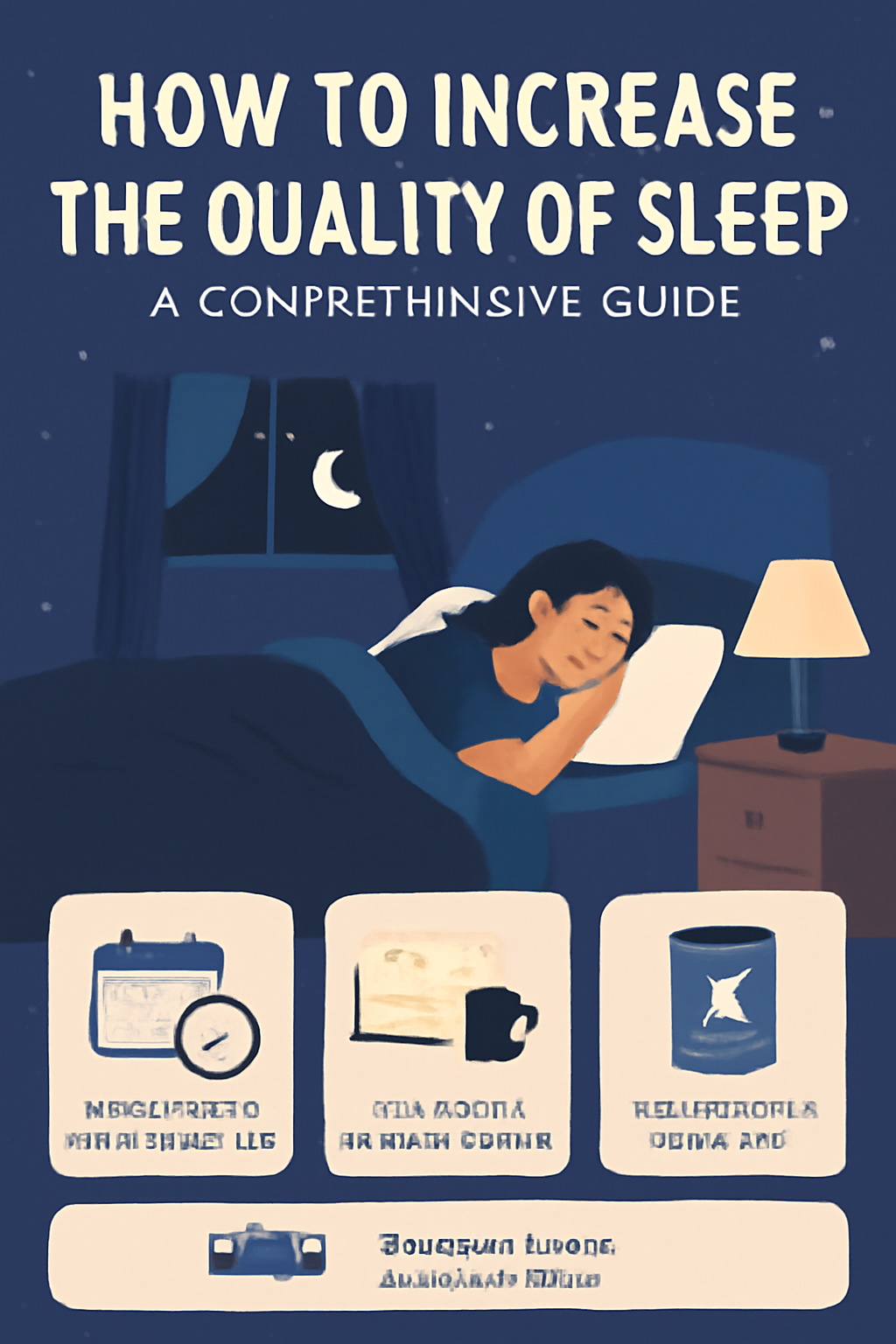We all do it, every day, yet most of us hardly ever think about sleep. All of us need quality sleep for our bodies to function well and our minds to function properly, but the benefits of sleep are more than just being well-rested. From enhancing our cognitive abilities to strengthening our immune system, proper snooze aids in how we emote and even helps our metabolism. Yet many people have a hard time sleeping well, a deficit that has been linked to fatigue, irritability, lack of focus, and long-term health problems.
How to increase the quality of sleep and what you can do in terms of simple habits and lifestyle changes to sleep through the night and get sufficient rest.
Understanding Sleep
Before we get into the ways to promote better sleep, let’s learn the science of sleep. The sleep cycle includes two major stages: Non-Rapid Eye Movement (NREM) and Rapid Eye Movement (REM) sleep. All these stages are equally important to ensure that the body and brain benefit from the required restorative effects.
- NREM Sleep: This stage is separated into three stages, and this is when the body repairs and regenerates cells, secures the immune system and releases growth hormones.
- REM Sleep: This is crucial for cognitive processes, including memory retention, learning, and emotional control. That’s also where you dream.
Normal sleep consists of several cycles per night; each cycle is about 90 minutes long. Multiple full cycles are important for quality of sleep. Lack of sleep or interrupted sleep can impair cognitive function, suppress immunity, and have a host of other negative effects.
Tips to Improve Sleep Quality
1. Establish a Consistent Sleep Schedule
One of the easiest and most effective things to do is sleep on a schedule. Sticking to a consistent routine of when you go to sleep and wake up can help you maintain normal circadian rhythm, your body’s internal clock. This internal clock controls your attention, your sleep-wake cycles, and functions best when its schedule is consistent.
Here are tips for getting on a good sleep schedule:
- Establish a bedtime: Decide on a bedtime that will result in 7-9 hours of sleep, depending on your age and personal needs.
- Keep at it on weekends: You might be tempted to lounge in bed on the weekends, but if you work through a weekend day, try to stick to a similar schedule.
- Limit naps: If you nap in the daytime, keep it to a brief period (20-30 minutes) and don’t nap too late in the day.
2. Create a Relaxing Bedtime Routine
Establishing a relaxing pre-sleep standard signal to your body that it’s time to wind down and furl things in. Relaxing before you go to bed can ease stress and help you sleep better.
Relaxing bedtime routine ideas:
- Read a Book: Pick up something light and not too stimulating.
- Take a warm bath or shower: The decrease in body temperature you experience when you come out of a warm bath will induce sleep.
- Mindfulness and meditation practices: Use deep breathing and guided mindfulness meditation to declutter your thoughts.
- Soothe with music: Mellow, slow tunes can help to soothe you and lull you to sleep.
3. Screen Time Before Bed is Counter Productive
Looking at a phone, tablet, computer or television before bed can disrupt your sleep with the blue light they emit. Blue light interferes with the production of melatonin, a hormone that helps produce sleep, so it is more difficult to fall asleep and stay asleep.
In order to promote better sleep quality, try to avoid screentime from at least 30-60 minutes prior to bedtime. Instead of mindlessly scrolling through social media or putting on a TV show, opt for a restful activity with no screen time involved. If you must use a device, try using a blue light filter or a night mode setting, or wearing blue light-absorbing glasses.
4. Create a Sleep-Friendly Environment
The place where you sleep greatly affects the quality of your sleep. A room that feels messy, loud, or just plain uncomfortable can make it hard to fall asleep and stay asleep.
How to make your bedroom more sleep-friendly:
- Invest in a good mattress and pillows: Your mattress should offer enough support for your body, and your pillows should be comfortable depending on the position you like to sleep in.
- Adjust the temperature: The best bedroom temperature for sleep is between 60-67°F (15-20°C). A cooler sleep environment is paramount for a good night’s sleep.
- Limit noise and light: Silence your surrounding environment with earplugs, a white noise machine or noise-cancelling headphones. Also, use blackout curtains to block light; exposure to light can mess with your internal clock.
- Clean your space up: It encourages peace of mind if everything around you are tidy and calming, and when it is, it can make to easier to drift off to sleep.
5. Diet and Caffeine Watch what you eat and drink.
The things you put in your body can have a major effect on the quality of your sleep. Some foods and drinks can impact your ability to fall asleep and stay asleep; particularly caffeine and alcohol.
- Cut down on caffeine: A stimulant, caffeine can remain in your system for several hours. Skip coffee, tea, chocolate and energy drinks at least six hours before bedtime.
- Watch the liquor: Though alcohol can induce drowsiness, it can actually also interfere with later stages of sleep and cause fragmented sleep.
- Don’t eat big meals before bed: Larger meals eaten shortly before bedtime can cause indigestion, making sleep uncomfortable. If you’re hungry before bedtime, choose a small, sleep-inducing snack, like a handful of almonds or a banana.
- Hydration: Water is essential, but avoid guzzling lots of water right before bed to limit bathroom runs in the middle of the night.
6. Exercise Regularly
Studies suggest sleeping better with regular exercise. Physical activity also decreases stress, anxiety and depression, all of which can interfere with sleep. It also encourages deeper sleep stages like slow-wave sleep, which is responsible for physical recovery.
However, timing matters. Exercising late at night can stimulate you, making it more difficult for you to fall asleep. Try to finish any vigorous workouts at least 3 hours before going to bed. Light exercises closer to bedtime that are less likely to gruff up the nooks and crannies in your system (yes, that’s a technical term) would be things like stretching or gentle yoga.
7. Manage Stress and Anxiety
And constant worry and anxiety can have a negative impact on sleep quality, causing it to be hard to wind down and fall asleep at night. And if you’re unable to calm your thoughts, it can not only keep you up at night, but lead to a restless night’s sleep.
Here are a few ways to mitigate the stress and anxiety:
- Use relaxation exercises: Practice deep breathing, progressive muscle relaxation, or guided imagery to clear your mind and relax your body.
- Put your thoughts on paper: If you’re having trouble going to sleep because worries are going through your mind, write down your concerns in a journal before you go to bed. Write down what’s on your mind and any tasks you have to do tomorrow.
- Get professional help: If stress or anxiety are strongly influencing or disrupting your sleep, get help from a therapist or counselor. Cognitive Behavioral Therapy (CBT) This type of therapy is known to be especially successful concerning sleep disturbances as a result of anxiety.
8. Get Exposure to Natural Light
Light dictates your body’s internal clock. Morning, natural sunlight helps tell our body we need to wake and be alert. Light exposure during the day, particularly in the morning, is known to improve sleep at night.
On the other hand, don’t expose yourself to bright artificial lights in the evening, since they can disrupt your body’s natural production of melatonin. This means you should turn off bright overhead lights and lower your screen time when it gets dark outside.
9. Address Sleep Disorders
Poor quality sleep could be an indication of an underlying sleep disorder. Having sleep disorders like sleep apnea, insomnia, restless leg syndrome, or narcolepsy may disrupt your sleep.
If you think a sleep disorder is getting in the way of good quality sleep, talk to a health care provider or a sleep specialist. Good diagnosis and course of treatment will help you to pinpoint the cause of your sleep problems.
Conclusion
Better sleep means better overall health Sleep plays an important role in maintaining good physical and mental health. You can greatly improve the quality of your sleep by following these tips to get regular sleep, establish a relaxing bedtime routine, set up your sleep environment, reduce stress, and address problems that may be interfering with your sleep. With a focus on sleep and some shifts in how you live life, you can see significant improvements in how you feel, from improving your focus and energy to enhancing your emotional resilience.
And remember, how to increase the quality of sleep is not just about how many hours of sleep you get, it’s about how restorative that sleep is. With a few tricks, you can open your eyes feeling refreshed and up for whatever the day may throw at you.








